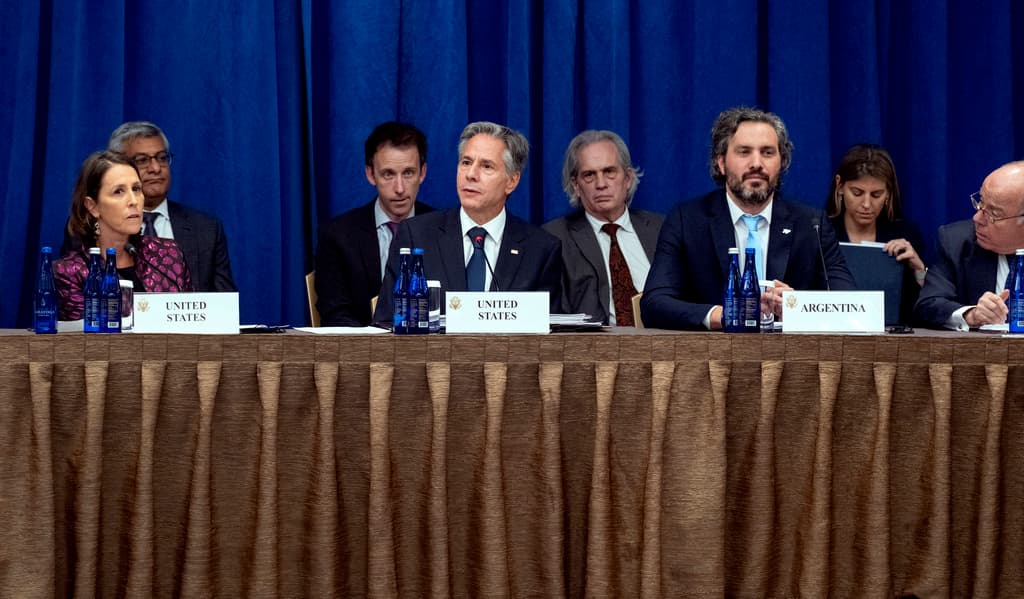America’s New Atlantic Partnership Looks Piddling Next To Communist China’s Ambitions in the Global South
Biden’s pet issue, climate change, is dwarfed by the priorities on which the Communist Chinese are challenging him.

The liberal internationalists in Washington are in need of a geopolitical reckoning. In their visits to Communist China, their pandering to the United Nations — in which, by the by, Iran is due to assume Chairmanship of the Human Rights Council Social Forum in November — and their insistence on diversity, equity, and inclusion as a core tenet of American foreign policy, they are becoming detached from reality.
Feature the American-led Partnership for Atlantic Cooperation, which the Biden administration, along with 31 other littoral Atlantic Ocean countries, signed this week on the sidelines of the United Nations General Assembly. Ostensibly, the initiative is an attempt by Washington to court the Global South. It includes countries like Brazil, Senegal, Gabon, Costa Rica, Argentina, and Nigeria.
At first glance, this is a promising step. Decades of American disregard of the developing world have helped to compromise our supply chains and global security. All the while, Beijing’s African courtship has supplied it with access to critical minerals. In the Congo, China owns 15 of the country’s 17 cobalt operations. Elsewhere in Africa, China’s control of port infrastructure could enable it to securitize key maritime routes.
In Latin America, President Xi and his henchmen have been busy snapping up natural resources and signing security agreements — including for cooperation in outer space. Washington’s shift to a more strategic consideration of the Global South is, then, a welcome development. Almost. For the partnership “will not deal with matters related to defense, security, and governance.”
So reads the initiative’s governing declaration. It turns out that the partnership is fundamentally an environmental one, centered around President Biden’s pet project, climate change. Its stated aim is to facilitate policy coordination and scientific exchange on matters such as “maritime plastic pollution,” “underwater noise,” climate resilience, and early warning systems in case of severe weather.
No doubt, these are worthwhile matters. Yet they appear rather piddling in the face of Communist Chinese efforts to forge novel, anti-Western, trade and diplomatic blocs — as in the recently expanded BRICS — and, through schemes like its Global Security Initiative and the Global Development Initiative, to rope developing nations into its ambition to transform the global order.
In its current form, the Atlantic Cooperation initiative fails to deliver to Global South nations what they covet most — a meaningful say in global economic and security architectures. Once again, the Biden Administration’s ham-fisted green agenda and its indulgence of the American left have bungled a chance to portray America as a credible alternative to China.
South Atlantic nations today face challenges that span piracy and political instability – witness the August coup in Gabon, and more recent attempts in nearby Equatorial Guinea, Côte d’Ivoire, and Gambia, all now signatories to the Atlantic initiative. Gulf of Guinea countries also have to contend with illicit fishing – including from China, which often sails within their exclusive economic zones.
Chinese boats off Senegal catch as many fish in a week as Senegal’s boats do in a year. Off Argentina’s coast, “floating cities” of some 600 Chinese vessels exploit maritime laws to plunder the sea. Granted, the partnership does call for raising states’ “access to maritime domain awareness technology.” Yet it goes no further. Its dismissal of security and governance matters suggests it likely never will.
The frameworks that today govern such issues — the Yaoundé Architecture, say — remain insufficient. They also fail to adequately address surrounding challenges of human, arms, and drug trafficking, to say nothing of countering Chinese efforts to install military outposts along Atlantic Ocean shores.
Beijing supposedly has plans for military bases in Angola and Equatorial Guinea. It has increased its arms sales to Brazil and Argentina. In Argentina, a proposed Chinese port facility in Rio Grande, at South America’s southernmost tip, could facilitate its control of transit between the South Atlantic, South Pacific, and Southern Oceans. The Partnership for Atlantic Cooperation could have begun to address this, and other issues.
It could have given Global South countries greater agency over critical policy areas and facilitated America’s improved relations with their respective governments. No doubt environmental considerations matter. Yet the reality is that, in today’s geopolitical environment, defense, security, governance — the very issues that the initiative skirts — matter more. Someone should tell Washington.

